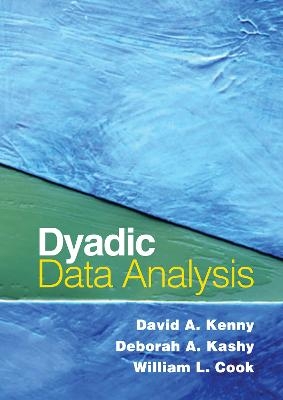
Dyadic Data Analysis
Guilford Press (Verlag)
978-1-4625-4613-8 (ISBN)
Interpersonal phenomena such as attachment, conflict, person perception, learning, and influence have traditionally been studied by examining individuals in isolation, which falls short of capturing their truly interpersonal nature. This book offers state-of-the-art solutions to this age-old problem by presenting methodological and data-analytic approaches useful in investigating processes that take place among dyads: couples, coworkers, parent and child, teacher and student, or doctor and patient, to name just a few. Rich examples from psychology and across the behavioral and social sciences help build the researcher's ability to conceptualize relationship processes; model and test for actor effects, partner effects, and relationship effects; and model and control for the statistical interdependence that can exist between partners. The companion website provides clarifications, elaborations, corrections, and data and files for each chapter.
David A. Kenny, PhD, is Board of Trustees Professor in the Department of Psychology at the University of Connecticut, and he has also taught at Harvard University and Arizona State University. He served as first quantitative associate editor of Psychological Bulletin. Dr. Kenny was awarded the Donald Campbell Award from the Society of Personality and Social Psychology. He is the author of five books and has written extensively in the areas of mediational analysis, interpersonal perception, and the analysis of social interaction data. Deborah A. Kashy, PhD, is Professor of Psychology at Michigan State University (MSU). She is currently senior associate editor of Personality and Social Psychology Bulletin and has also served as associate editor of Personal Relationships. In 2005 Dr. Kashy received the Alumni Outstanding Teaching Award from the College of Social Science at MSU. Her research interests include models of nonindependent data, interpersonal perception, close relationships, and effectiveness of educational technology. William L. Cook, PhD, is Associate Director of Psychiatry Research at Maine Medical Center and Spring Harbor Hospital, and Clinical Associate Professor of Psychiatry at the University of Vermont College of Medicine. Originally trained as a family therapist, he has taken a lead in the dissemination of methods of dyadic data analysis to the study of normal and disturbed family systems. Dr. Cook’s contributions include the first application of the Social Relations Model to family data, the application of the Actor-Partner Interdependence Model to data from experimental trials of couple therapy, and the development of a method of standardized family assessment using the Social Relations Model.
1. Basic Definitions and Overview
- Nonindependence
- Basic Definitions
- Data Organization
- A Database of Dyadic Studies
2. The Measurement of Nonindependence
- Interval Level of Measurement
- Categorical Measures
- Consequences of Ignoring Nonindependence
- What Not to Do
- Power Considerations
3. Analyzing Between- and Within-Dyads Independent Variables
- Interval Outcome Measures and Categorical Independent Variables
- Interval Outcome Measures and Interval Independent Variables
- Categorical Outcome Variables
4. Using Multilevel Modeling to Study Dyads
- Mixed-Model ANOVA
- Multilevel-Model Equations
- Multilevel Modeling with Maximum Likelihood
- Adaptation of Multilevel Models to Dyadic Data
5. Using Structural Equation Modeling to Study Dyads
- Steps in SEM
- Confirmatory Factor Analysis
- Path Analyses with Dyadic Data
- SEM for Dyads with Indistinguishable Members
6. Tests of Correlational Structure and Differential Variance
- Distinguishable Dyads
- Indistinguishable Dyads
7. Analyzing Mixed Independent Variables: The Actor–Partner Interdependence Model
- The Model
- Conceptual Interpretation of Actor and Partner Effects
- Estimation of the APIM: Indistinguishable Dyad Members
- Estimation of the APIM: Distinguishable Dyads
- Power and Effect Size Computation
- Specification Error in the APIM
8. Social Relations Designs with Indistinguishable Members
- The Basic Data Structures
- Model
- Details of an SRM Analysis
- Model
- Social Relations Analyses: An Example
9. Social Relations Designs with Roles
- SRM Studies of Family Relationships
- Design and Analysis of Studies
- The Model
- Application of the SRM with Roles Using Confirmatory Factor Analysis
- The Four-Person Design
- Illustration of the Four-Person Family Design
- The Three-Person Design
- Multiple Perspectives on Family Relationships
- Means and Factor Score Estimation
- Power and Sample Size
10. One-with-Many Designs
- Design Issues
- Measuring Nonindependence
- The Meaning of Nonindependence in the One-with-Many Design
- Univariate Analysis with Indistinguishable Partners
- Univariate Estimation with Distinguishable Partners
- The Reciprocal One-with-Many Design
11. Social Network Analysis
- Definitions
- The Representation of a Network
- Network Measures
- The p1
12. Dyadic Indexes
- Item Measurement Issues
- Measures of Profile Similarity
- Mean and Variance of the Dyadic Index
- Stereotype Accuracy
- Differential Endorsement of the Stereotype
- Pseudo-Couple Analysis
- Idiographic versus Nomothetic Analysis
- Illustration
13. Over-Time Analyses: Interval Outcomes
- Cross-Lagged Regressions
- Over-Time Standard APIM
- Growth-Curve Analysis
- Cross-Spectral Analysis
- Nonlinear Dynamic Modeling
14. Over-Time Analyses: Dichotomous Outcomes
- Sequential Analysis
- Statistical Analysis of Sequential Data: Log-Linear Analysis
- Statistical Analysis of Sequential Data: Multilevel Modeling
- Event-History Analysis
15. Concluding Comments
- Specialized Dyadic Models
- Going Beyond the Dyad
- Conceptual and Practical Issues
- The Seven Deadly Sins of Dyadic Data Analysis
- The Last Word
| Erscheinungsdatum | 19.10.2020 |
|---|---|
| Verlagsort | New York |
| Sprache | englisch |
| Maße | 152 x 229 mm |
| Gewicht | 656 g |
| Themenwelt | Geisteswissenschaften ► Psychologie ► Allgemeine Psychologie |
| Geisteswissenschaften ► Psychologie ► Pädagogische Psychologie | |
| Geisteswissenschaften ► Psychologie ► Sozialpsychologie | |
| ISBN-10 | 1-4625-4613-7 / 1462546137 |
| ISBN-13 | 978-1-4625-4613-8 / 9781462546138 |
| Zustand | Neuware |
| Haben Sie eine Frage zum Produkt? |
aus dem Bereich


